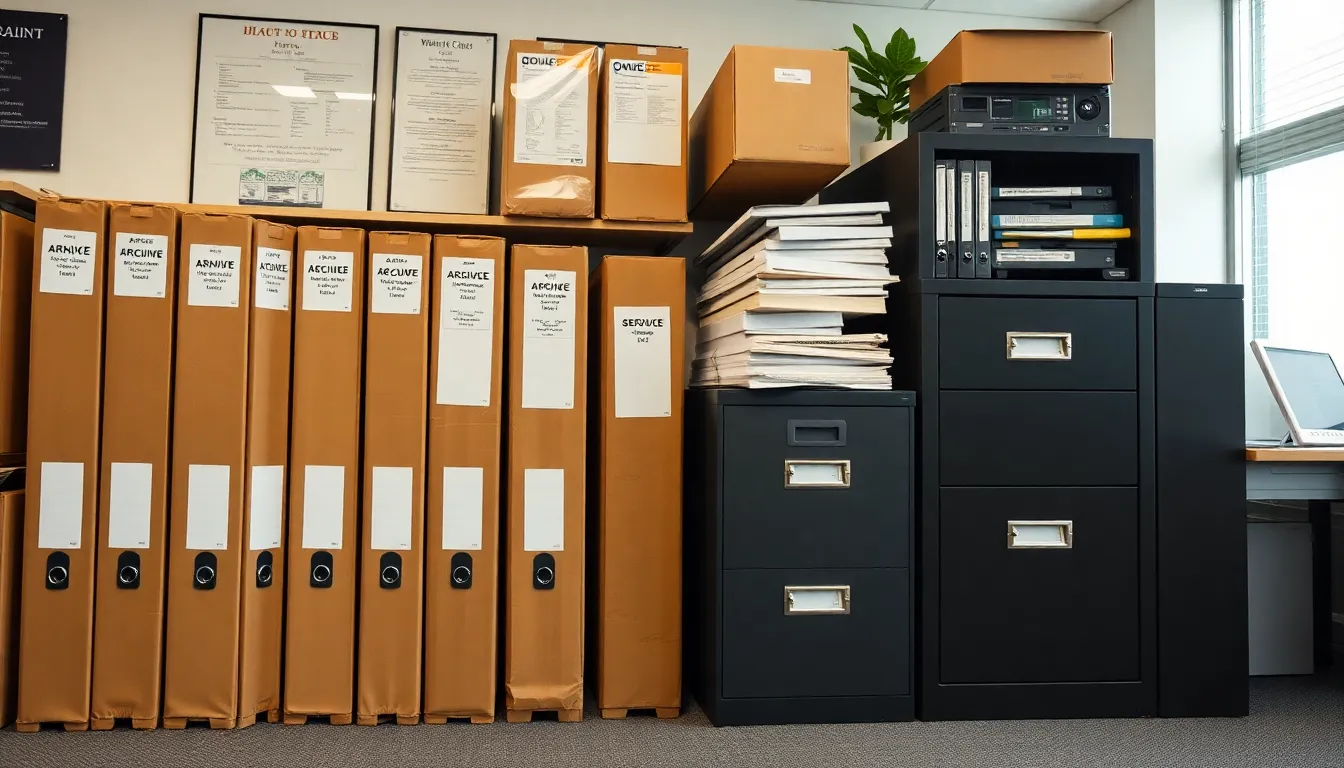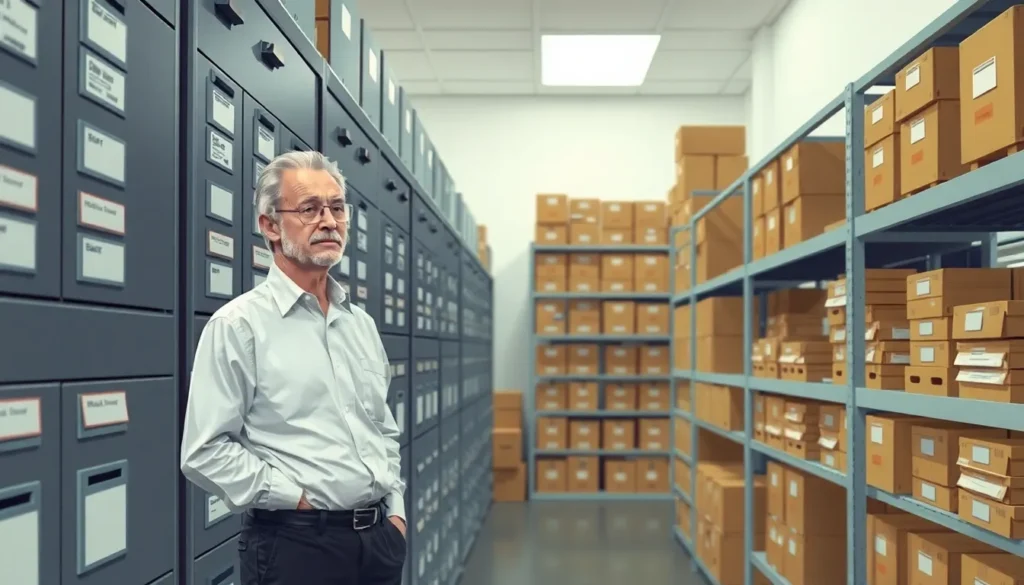In a world overflowing with data, finding the right archive storage solution can feel like searching for a needle in a digital haystack. Imagine your files neatly tucked away, safe from the chaos of everyday clutter. No more diving into a sea of documents or playing hide-and-seek with that important contract. With the right storage, it’s like having a personal librarian who never complains about overtime.
But let’s be real—archive storage isn’t just about organization; it’s about peace of mind. Whether you’re a small business owner or managing a large enterprise, the right solution can save time, money, and maybe even a few gray hairs. So why not explore how modern archive storage can transform your data management game? After all, who wouldn’t want to be the hero of their own office story?
Table of Contents
ToggleOverview of Archive Storage Solutions
Archive storage solutions refer to systems designed to store data that is infrequently accessed. They offer long-term storage options that ensure vital information remains secure and retrievable.
What Are Archive Storage Solutions?
Archive storage solutions encompass various methods for preserving data, including cloud storage, magnetic tape systems, and optical media. These solutions cater to different storage needs, providing flexibility for individuals and businesses. Organizations utilize these methods to retain historical records, legal documents, and essential files. Many archive solutions come with advanced features, such as automated backup and retrieval systems, to enhance data management efficiency.
Importance of Archive Storage Solutions
Archive storage solutions play a critical role in information management. They ensure data redundancy, protecting against loss or corruption. Legal requirements often mandate that businesses retain records, making effective archiving essential. Cost efficiency also comes into play, as these solutions typically reduce storage expenses by utilizing lower-cost mediums. Improved organization results from proper archival practices, enabling quicker access to necessary documents when required.
Types of Archive Storage Solutions

Archive storage solutions encompass a variety of options tailored to specific data needs. Whether utilizing physical or digital platforms, these solutions enhance data management and retrieval.
Physical Storage Options
Organizations often choose physical storage methods for long-term document preservation. Magnetic tape systems provide a reliable choice for data archiving, known for their longevity and low cost. Alternatively, file cabinets or safe storage boxes manage sensitive information, ensuring access when required. Archive boxes offer a scalable solution, accommodating various document sizes and types. Businesses frequently opt for off-site facilities that specialize in secure document storage, limiting risk of loss or damage.
Digital Storage Solutions
Many businesses leverage digital storage solutions for efficiency and accessibility. Cloud storage platforms stand out for their scalability, allowing easy access from any device with an internet connection. Virtual tape libraries simulate traditional tape storage, offering faster backup and retrieval processes. Dedupe technology efficiently reduces file sizes, optimizing storage capacity. Additionally, optical media solutions, such as DVDs or Blu-ray discs, provide a durable option for archiving critical data. Each digital method caters to different access needs while ensuring data security and compliance.
Benefits of Using Archive Storage Solutions
Archive storage solutions provide numerous advantages, enhancing both personal and business data management practices. Key benefits include cost-effectiveness and improved data management.
Cost-Effectiveness
Archive storage solutions significantly reduce costs associated with data retention. They minimize spending on expensive primary storage systems by efficiently utilizing low-cost options. Organizations save on hardware and maintenance by relying on digital archives, especially in cloud environments. Long-term data retention becomes more affordable without compromising security. Implementing tape storage, for instance, further lowers expenses associated with data retrieval and management. Reducing physical storage space also lowers overhead costs, allowing businesses to allocate resources elsewhere. Ultimately, these solutions create a more economical approach to data management.
Improved Data Management
Archive storage solutions improve data management by simplifying file organization. Access becomes quicker and more efficient, ensuring necessary documents are readily available. With structured systems in place, retrieval times decrease, enhancing productivity in workplace settings. Meeting compliance requirements becomes more manageable with organized data, minimizing the risk of legal issues. Additionally, centralizing archived data streamlines processes, making it easier to search for files. Implementing these solutions fosters better collaboration across teams, ultimately creating more efficient workflows. Businesses experience smoother operations as archived information is just a few clicks away.
Best Practices for Implementing Archive Storage Solutions
Implementing archive storage solutions requires careful planning and assessment. Organizations must understand their specific needs to ensure data is managed effectively.
Assessing Your Needs
Start by identifying the types of data needing archiving. Prioritize data based on access frequency and compliance requirements. Evaluate current storage solutions to pinpoint gaps. Review the volume of data currently being generated and consider future growth projections. Determine retention policies as this guides both storage duration and security considerations. Clarifying these aspects allows an organization to streamline their archive strategies.
Choosing the Right Solution
Select solutions that align with operational demands. Consider physical options like magnetic tape systems for high-capacity requirements. Explore cloud storage for flexibility and easy access to data. Assess the scalability of potential solutions to accommodate data growth. Evaluate security features and compliance standards to safeguard sensitive information. Ensure that the chosen solution integrates seamlessly with existing systems for optimal efficiency. Each selection made should enhance overall data management practices.
Choosing the right archive storage solution is crucial for effective data management. By embracing modern options tailored to specific needs, individuals and businesses can enhance organization and security. The right system not only simplifies access to important files but also ensures compliance with legal requirements.
Investing in a well-planned archiving strategy leads to significant cost savings and improved productivity. As data continues to grow, adopting the most suitable archive storage solutions will empower organizations to navigate their information landscape with confidence. Ultimately, efficient archiving fosters collaboration and streamlines workflows, paving the way for success in a data-driven world.



